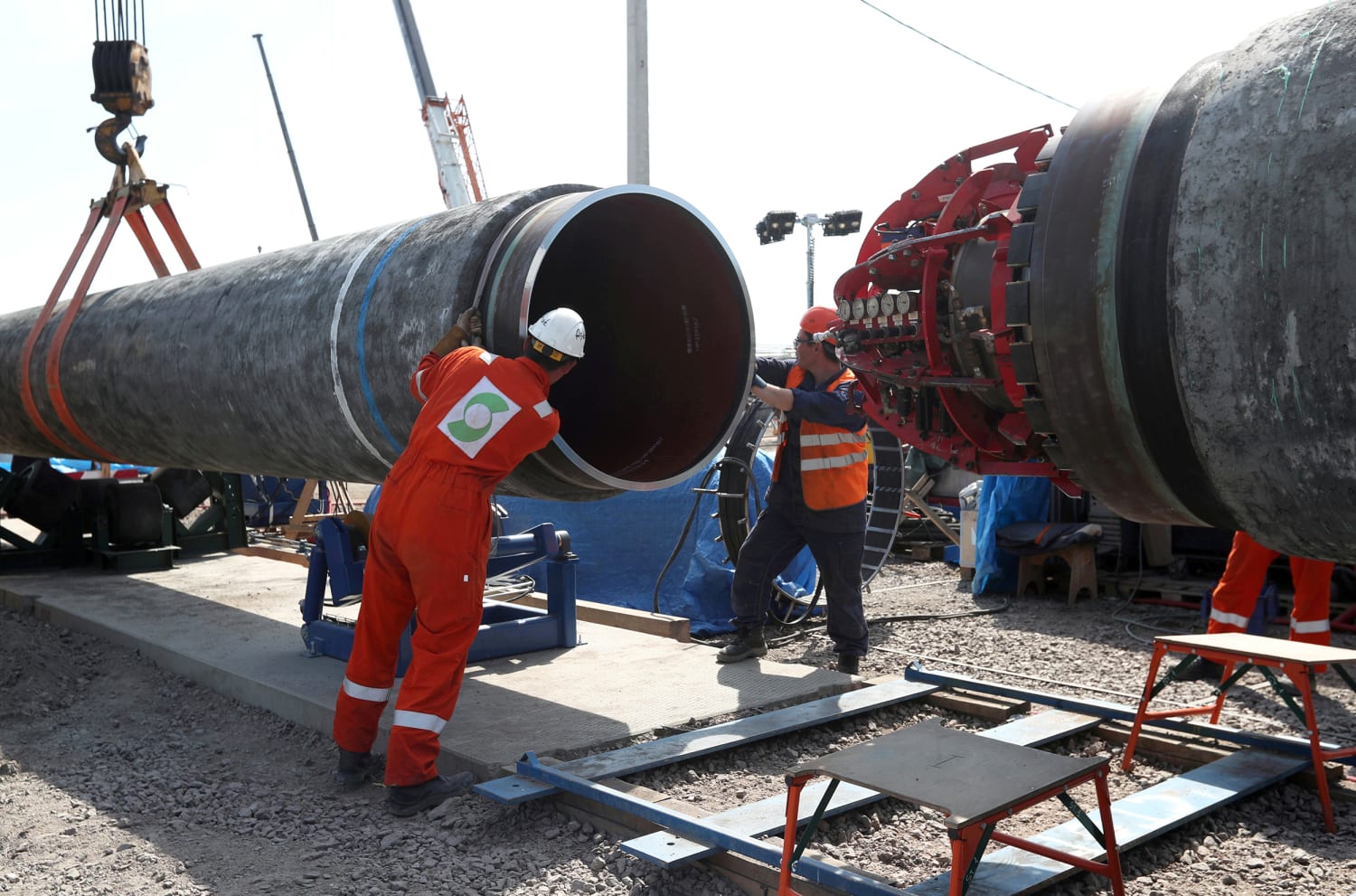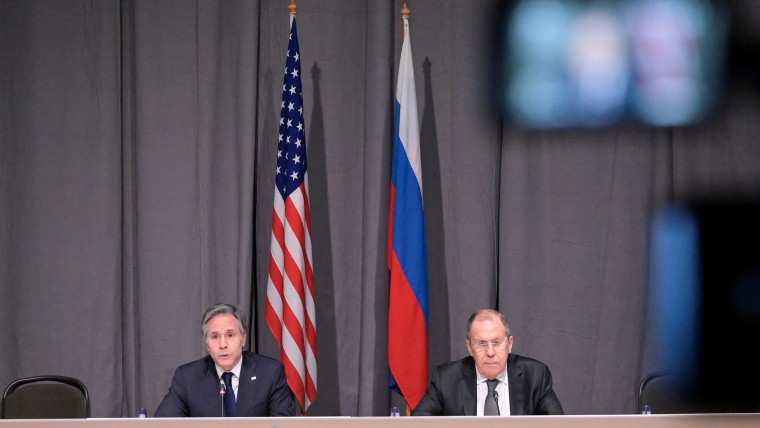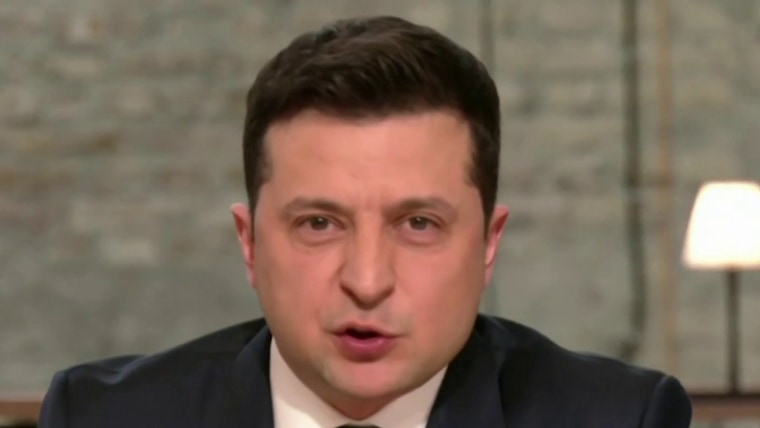WASHINGTON — The Biden administration is trying to fend off efforts in Congress to impose sanctions on a Russian natural gas pipeline to Europe, putting it at odds with Eastern European allies and some Democratic lawmakers.
While the Biden administration and the German government have lobbied lawmakers against the sanctions, Ukraine has appealed publicly to Congress to press ahead with the measures, saying the nearly complete pipeline project will make Kyiv even more vulnerable to Moscow’s pressure tactics.
The political fight in Congress is playing out even as the White House is warning Russia to pull its troops back from Ukraine’s border or face harsh economic penalties.
The administration in May defied Congress and suspended sanctions on the Nord Stream 2 pipeline, citing the need to avoid upsetting relations with Germany and other European partners. Both Democrats and Republicans blasted the decision at the time, and the fallout continues to create headaches for the White House.
The battle has dragged on for months, delaying the White House’s broader legislative agenda as Republican advocates of sanctions hold up a defense spending bill and dozens of nominees for positions at the State Department and other government posts.
The Senate is poised to vote on a measure possibly Friday or next week that would override the administration’s suspension of the sanctions and require the president to seek congressional approval if he wanted to waive the sanctions in the future. Sen. James Risch of Idaho, the ranking Republican on the Foreign Relations Committee, sponsored the proposal, which is an amendment to the National Defense Authorization Act, the massive spending bill that funds the military.
But it is unclear how many Democrats will break ranks with the White House and support the amendment.
Democrat Sen. Bob Menendez of New Jersey, chairman of the Foreign Relations Committee, who slammed President Joe Biden’s decision in May to suspend the sanctions, has proposed an alternative amendment that threatens harsh sanctions against Russia if it invades Ukraine. But the bill would not change the status quo on Nord Stream 2, allowing the president to decide whether to impose sanctions — unless Russian troops move to topple the Kyiv government.
“There is no better way to deter Russian aggression against Ukraine than by stopping Putin’s Nord Stream 2 pipeline. My bill will do that,” Risch said in an email.
“The Democrats’ bill simply serves to telegraph to Putin that he should wait to attack Ukraine until after his pipeline is complete, and gives the administration complete discretion to ignore Congress’ will,” he wrote.
Menendez said his amendment “has one simple goal: deter Russian aggression against Ukraine.”
He added: “The Kremlin has a choice to make. If they invade, they would do so knowing the U.S. will immediately unleash a host of crippling and mandatory sanctions against senior Russian leaders, its banking and other industries, and its ability to issue sovereign debt. This should be a priority for those looking to support our Ukrainian allies at this critical moment.”
A White House spokesperson said administration officials support efforts in Congress to prepare a package of sanctions if Russia invades Ukraine but not measures that could undermine trans-Atlantic ties.
“The administration is working with Congress on a legislative package of sanctions in the event Russia invades Ukraine further, looking at how to maximize potential costs to Russia while maintaining strong trans-Atlantic unity,” a White House spokesperson said.
“But we’re seeing some members of Congress press for sanctions that don’t actually deter Russia but do threaten trans-Atlantic unity in order to score political points at home — all while holding up critical national security funding on a range of unrelated issues. It makes no sense,” the spokesperson said.
The administration has maintained that it opposes the pipeline as a Russian geopolitical project but that the pipeline was a fait accompli by the time Biden entered office. Opponents disagree, saying there is still time to stop it.
Sen. Ted Cruz, R-Texas, an outspoken opponent of the pipeline, has blocked the confirmation of more than 50 nominees for State Department and other government positions since the Biden administration waived the sanctions in May.
Cruz indicated this week that he would lift the blockade on seven of the nominees if Risch’s amendment is voted on in the Senate and that he was prepared to allow more nominations to go forward if the amendment passed, said a Republican congressional aide briefed on the issue.
The pipeline, which is nearly finished, would send gas from Russia to Germany under the Baltic and North seas. Russia relies heavily on a pipeline in Ukraine to transport gas to Europe, and the Nord Stream 2 project would allow it to bypass Ukraine, depriving the country of lucrative transit revenues. Opponents of Nord Stream 2 say the new pipeline also removes a possible constraint on any plans by Russia to invade Ukraine.
Critics have long argued that the project would give Russian President Vladimir Putin a political weapon to use as leverage over European countries. The continent relies on Russia for about 40 percent of its natural gas supplies.
Some European politicians and regional analysts have accused Russia of trying to jack up gas prices by limiting supplies just as winter sets in. Russia has denied the charge. But analysts say that the Russian-stated owned energy giant Gazprom has been slow to fill up its gas storage sites in Europe and that it reduced gas transit through Ukraine in September and October.
Putin has suggested that rising gas prices would decline once the pipeline is operating.
“Of course, if we could expand supplies along this route, then, 100 percent, I can say with absolute certainty, the tension on the European energy market would significantly decline, and that would influence prices, of course. This is an obvious thing,” Putin said in October.
Republican congressional aides said the Biden administration needed to revisit its stance given events in recent months, including Russia’s moves in the energy market and its troop buildup on Ukraine’s border.
“Everything we predicted has come to pass,” a congressional aide said. The administration “has been proven so disastrously wrong so quickly.”
Some Democratic congressional aides said that the Republicans were merely using the issue as a partisan ploy and that the Risch amendment could hamstring the executive branch’s authority when it comes to sanctions.
During Thursday’s proceedings on the floor of the Senate, Republican Sen. Tom Cotton of Arkansas accused President Biden and his fellow Democrats of appeasing Russia. Cotton’s remarks sparked an angry response from Democratic Sen. Jeanne Shaheen, the usually reserved lawmaker from New Hampshire who has authored previous legislation imposing sanctions on Russia over the pipeline.
“I just have to take real umbrage at your suggestion, Senator Cotton,” Shaheen said. “I’m the one who Vladimir Putin refused a visa to get into Russia because of my opposition to Russia and to what Putin was doing. He didn’t deny you a visa to get into the country. So don’t talk to me about how I’ve not been tough enough on Russia, because that dog won’t hunt.”
Russia denied Shaheen a visa for a scheduled congressional trip to Moscow in 2017 after her outspoken support for tough economic sanctions.
Although construction of the pipeline is nearly complete, gas will not start flowing until German and European regulators give it regulatory approval, which could take several months and possibly not until the fall.
The German government, which has quietly lobbied against the sanctions in Congress, recently sought to reassure lawmakers about its stance in a document titled “Non-paper: Promoting Transatlantic Unity and Ukraine’s energy security in German-US relations.” The document, which was supposed to remain confidential, was first reported by Axios.
In the paper, Germany argues that Nord Stream 2 poses “no threat to Ukraine as long as reasonable gas transit is ensured” and says potential sanctions would amount to “a victory for Putin” because it would divide Western allies.
Sanctions would “undermine the commitment given to Germany” by Biden in discussions in July and “weaken the credibility of the U.S. government,” it said. “They would ultimately damage transatlantic unity.”
If Russia used the pipeline as a political weapon, Germany would be prepared to cooperate with the U.S. to counter it, the document says. “Measures could include public messaging, political measures, economic measures and support for victims of Russian malign activities,” it said.
The German Embassy in Washington declined to comment on the “non-paper” document.
Source: | This article originally belongs to Nbcnews.com













